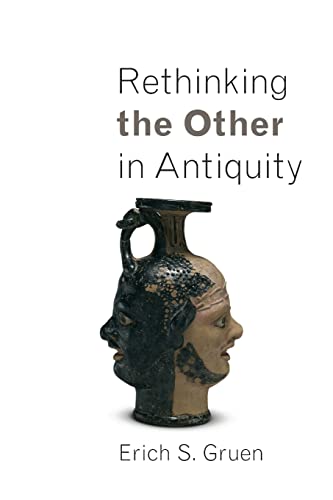Rethinking the Other in Antiquity (Martin Classical Lectures, 27)
Gruen, Erich S.
About the Book
Description:
Seller Inventory # hafa_Silver_0691156352
About this title:
Synopsis:
Prevalent among classicists today is the notion that Greeks, Romans, and Jews enhanced their own self-perception by contrasting themselves with the so-called Other--Egyptians, Phoenicians, Ethiopians, Gauls, and other foreigners--frequently through hostile stereotypes, distortions, and caricature. In this provocative book, Erich Gruen demonstrates how the ancients found connections rather than contrasts, how they expressed admiration for the achievements and principles of other societies, and how they discerned--and even invented--kinship relations and shared roots with diverse peoples.
Gruen shows how the ancients incorporated the traditions of foreign nations, and imagined blood ties and associations with distant cultures through myth, legend, and fictive histories. He looks at a host of creative tales, including those describing the founding of Thebes by the Phoenician Cadmus, Rome's embrace of Trojan and Arcadian origins, and Abraham as ancestor to the Spartans. Gruen gives in-depth readings of major texts by Aeschylus, Herodotus, Xenophon, Plutarch, Julius Caesar, Tacitus, and others, in addition to portions of the Hebrew Bible, revealing how they offer richly nuanced portraits of the alien that go well beyond stereotypes and caricature.
Providing extraordinary insight into the ancient world, this controversial book explores how ancient attitudes toward the Other often expressed mutuality and connection, and not simply contrast and alienation.
From the Inside Flap:
"This erudite and lucid treatment of the limits of tolerance and open-mindedness toward the Other in ancient Greece, Rome, and the Jewish world deals with a topic central to our evaluation of any society. The book will be an all-important source of information and will stimulate renewed discussion of the moral standards of the ancients in their attitudes toward foreigners. This absorbingly written work will lead to a reconsideration of questions regarding ethnic identity in the ancient Mediterranean world."--Benjamin Isaac, Tel Aviv University
"Gruen has produced an original and learned book that gives fresh insight into the complex issues of race in the ancient world and offers a more nuanced understanding of the interactions of ancient cultures that will hopefully enable us all to view the interactions between cultures in today's world with greater sensitivity."--David Potter, University of Michigan
"Did ancient Greeks regard Persians and Egyptians as servile 'barbarians,' by way of indicating their own superiority? Did Romans believe that Carthaginians were essentially perfidious, Gauls and Germans primitive, Jews weird and despicable? With deep learning and a graceful style, Gruen shows that these modern generalizations are wide of the mark, and that ancient attitudes toward foreigners were nuanced and by and large positive. The book invites us to inquire whether scholars have projected onto the classical world a sense of ethnic 'otherness' more characteristic of our own."--David Konstan, Brown University
"Greeks often referred to other peoples as 'barbarians,' while Romans considered themselves destined to rule the world, and viewed many of their subjects and adversaries (Greeks, Jews, Persians) with distrust or contempt. 'Otherness' can seem an ineradicable element of Greek, Roman, and Jewish thought. But Erich Gruen urges us to 'rethink the Other,' arguing with his customary verve and erudition that ancient attitudes were more nuanced than has often been supposed."--Christopher Jones, Harvard University
"This is an excellent and timely book on an important topic. Gruen persuasively argues that the model of the Other does not work for antiquity. Instead of consistently negative stereotypes he finds complexity and nuance, negative stereotypes being balanced by positive images, a willingness to acknowledge foreign influence on one's own culture, and, particularly striking, widespread desire to claim kinship relationships."--Stanley M. Burstein, professor emeritus, California State University, Los Angeles
"Gruen offers a defense of many prominent cultures--including the Greeks, Romans, Egyptians, Jews, Gauls, and Carthaginians--against overextended charges of polarizing worldviews of each other. He looks at hundreds of examples and finds that the ancient sources' discussions of difference also recognize sameness, borrowing, relatedness, and indebtedness. The entire book is magnificently documented. The range of scholarship is very impressive."--Donald Lateiner, Ohio Wesleyan University
Bibliographic Details
Title: Rethinking the Other in Antiquity (Martin ...
Publisher: Princeton University Press
Publication Date: 2012
Binding: Soft cover
Condition: very good
